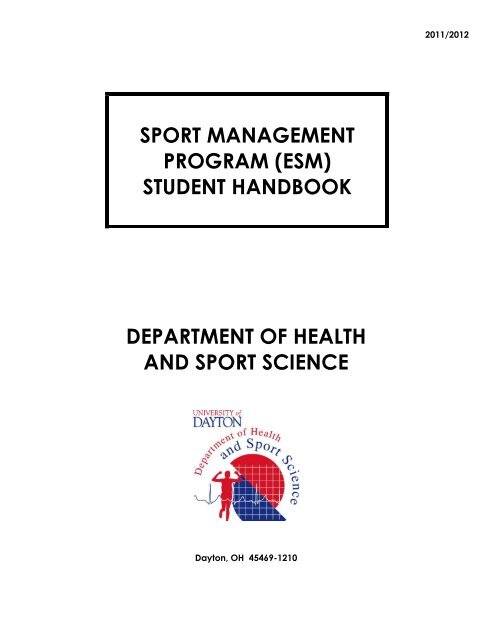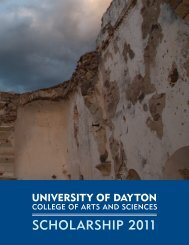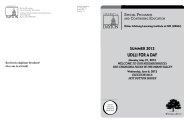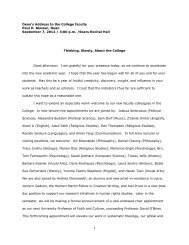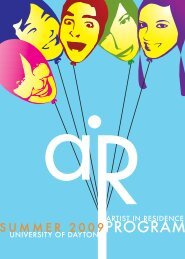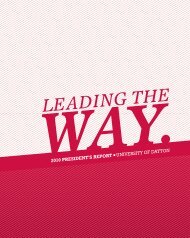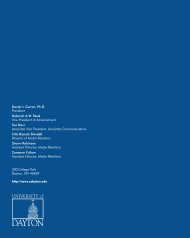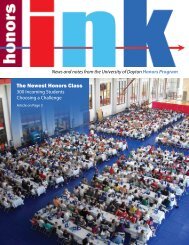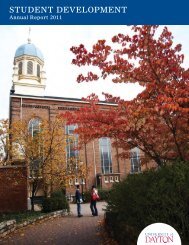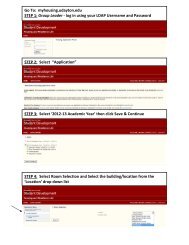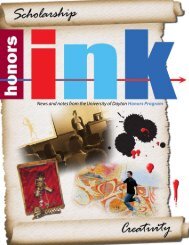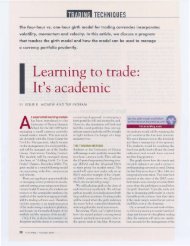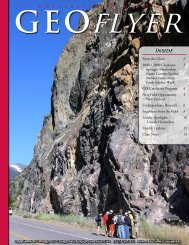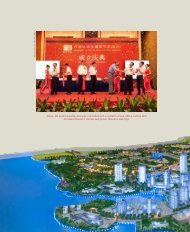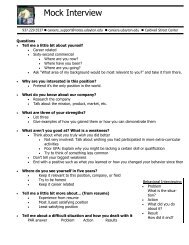SPORT MANAGEMENT PROGRAM (ESM ... - University of Dayton
SPORT MANAGEMENT PROGRAM (ESM ... - University of Dayton
SPORT MANAGEMENT PROGRAM (ESM ... - University of Dayton
You also want an ePaper? Increase the reach of your titles
YUMPU automatically turns print PDFs into web optimized ePapers that Google loves.
<strong>SPORT</strong> <strong>MANAGEMENT</strong><br />
<strong>PROGRAM</strong> (<strong>ESM</strong>)<br />
STUDENT HANDBOOK<br />
DEPARTMENT OF HEALTH<br />
AND <strong>SPORT</strong> SCIENCE<br />
<strong>Dayton</strong>, OH 45469-1210<br />
2011/2012
Letter From Faculty<br />
TABLE OF CONTENTS<br />
The Sport Management Program 1<br />
Mission Statement 2<br />
Portfolio Development 3<br />
Basic Competencies and General Education Requirements 4-5<br />
Sport Management Checksheet 6<br />
Thematic Cluster 7-8<br />
Support Services 9<br />
Grievance Procedures 10<br />
Transfer Students 11-12<br />
Academic Advising 13-15<br />
Academic Standing 16<br />
Class Attendance 17<br />
Course Syllabi 18<br />
Department Committees 19<br />
Evaluation <strong>of</strong> Courses, Pr<strong>of</strong>essors, and Programs 20<br />
Student Awards 21<br />
Grading Options 22<br />
Academic Honor Code 23<br />
Pr<strong>of</strong>essional Development Courses/Activities 24
DATE: August 2011<br />
TO: First-Year and Undergraduate Transfer Students in the Department <strong>of</strong> Health and<br />
Sport Science<br />
FROM: Janine T. Baer Lloyd L. Laubach<br />
Jennifer Dalton Jon K. Linderman<br />
Corinne M. Daprano Kimberly Ritterh<strong>of</strong>f<br />
George M. DeMarco Peter J. Titlebaum<br />
Gerry J. Gallo<br />
Welcome to the Department <strong>of</strong> Health and Sport Science. We are pleased that you have chosen to pursue<br />
your undergraduate education in one <strong>of</strong> our programs.<br />
The faculty, staff, and students in our department are committed to assisting you in your goal <strong>of</strong> becoming a<br />
pr<strong>of</strong>essional in your field <strong>of</strong> study. The effort you put forth in your coursework, field experiences, class<br />
attendance, and pr<strong>of</strong>essional involvement will be a major factor in reaching these pr<strong>of</strong>essional goals and in<br />
achieving the highest level <strong>of</strong> academic excellence.<br />
This handbook contains guidelines, policies, and information required for completing your undergraduate<br />
degree. It is YOUR RESPONSIBILITY to understand and fulfill the requirements and obligations <strong>of</strong> this<br />
handbook. Take the time to read it thoroughly, and retain it as a guide throughout your years <strong>of</strong> study. Feel<br />
free to ask our faculty any questions you have regarding the information in this handbook.<br />
Best wishes for a successful college career.<br />
SCHOOL OF EDUCATION AND ALLIED PROFESSIONS<br />
DEPARTMENT OF HEALTH AND <strong>SPORT</strong> SCIENCE<br />
300 College Park <strong>Dayton</strong>, Ohio 45469-1210<br />
Telephone (937) 229-4225 FAX (937) 229-4244 E-mail: hss@udayton.edu<br />
Dietetics; Exercise Physiology; Exercise Science; Nutrition; Physical Education; Physical Therapy; Pre Physical Therapy; Sport Management
THE <strong>SPORT</strong> <strong>MANAGEMENT</strong> <strong>PROGRAM</strong><br />
The field <strong>of</strong> sport administration is broad in scope; it includes sport and event management. The sport<br />
management pr<strong>of</strong>essional can work in the areas <strong>of</strong> amateur, collegiate, and pr<strong>of</strong>essional sport. Further<br />
opportunities are available in facility management (as well as a variety <strong>of</strong> positions within these facilities).<br />
Others work with companies that plan and direct entertainment, recreation, and sport events.<br />
Related areas include pr<strong>of</strong>essional positions in public and private recreation on the administrative and<br />
planning levels.<br />
It is a very demanding field requiring long hours, planning skills, the ability to work with a variety <strong>of</strong> people,<br />
and the ability to concurrently perform many seemingly unrelated activities. You should plan to move<br />
periodically in the developing years <strong>of</strong> your pr<strong>of</strong>essional life as many jobs have time limits. The sport<br />
management field, however, can be a pr<strong>of</strong>essionally rewarding career if you enjoy the above activities.<br />
Students should gain as many out-<strong>of</strong>-class experiences relating to sport management as possible during their<br />
undergraduate years - both during the school year and summer months. These experiences can be gained<br />
and credit awarded through pr<strong>of</strong>essional enrichment activities (see section in student handbook) and<br />
practica - HSS 255 (see <strong>University</strong> catalog description).<br />
The adage “one gains in proportion to the effort put into an endeavor” applies to your education. Your<br />
effort in class and out-<strong>of</strong>-class will reflect in your enjoyment and success in the field <strong>of</strong> sport management.<br />
http://soeap.udayton.edu/academic/hss/esm.html<br />
1
MISSION STATEMENT<br />
The mission <strong>of</strong> the Department <strong>of</strong> Health and Sport Science is to prepare students to be highly qualified<br />
pr<strong>of</strong>essionals in the health and sport science disciplines.<br />
The Department also believes its mission is to provide educational programs and instruction for the health<br />
fitness needs <strong>of</strong> all members <strong>of</strong> the <strong>University</strong> community.<br />
On the undergraduate level, Exercise Physiology graduates typically pursue MS/PhD programs in exercise<br />
physiology and/or nutritional biochemistry as well as pr<strong>of</strong>essional doctoral programs in Physical Therapy,<br />
Pharmacy, Chiropractic, Medicine, Dentistry, and Veterinary Medicine. Those not pursuing graduate school<br />
but have the requisite communications skills will be prime candidates for positions in the pharmaceutical,<br />
consumer products, medical equipment, and/or fitness industries. The Exercise Science Program is designed<br />
to prepare students for pr<strong>of</strong>essional opportunities in areas <strong>of</strong> corporate health, "wellness" programs, and<br />
health maintenance in a variety <strong>of</strong> settings. The Nutrition and Dietetics Programs prepare students for postbaccalaureate<br />
dietetic internships or prepr<strong>of</strong>essional practice programs. The Department prepares<br />
educators in Physical Education to meet the needs <strong>of</strong> the public and private schools. The Pre-Physical<br />
Therapy Program will prepare students for graduate school in Physical Therapy or other allied pr<strong>of</strong>essions.<br />
The Sport Management Program is designed to prepare students for pr<strong>of</strong>essional opportunities in private<br />
sports clubs, health clubs, sports organizations/federations, newspapers, television, sporting goods, and the<br />
multitudinous areas <strong>of</strong> recreation. On the graduate level, the Department <strong>of</strong>fers the Master <strong>of</strong> Science<br />
Degree in Education/Exercise Science and the Doctor <strong>of</strong> Physical Therapy Degree.<br />
In all the Department's activities, there is a constant search for excellence. The long-range goals and<br />
strategies relate to this search in teaching, research, inquiry, programs, recruitment <strong>of</strong> quality students, and<br />
service.<br />
2
PORTFOLIO DEVELOPMENT<br />
~A key to success in your career development!~<br />
1. Purpose - The pr<strong>of</strong>essional portfolio is a collection <strong>of</strong> materials, gathered over a period <strong>of</strong> time, which<br />
reflects the student’s progress in the course <strong>of</strong> study. Papers, projects, observations, service, or other<br />
materials deemed important will be included. The portfolio can be classified as a learning resume.<br />
These show writing ability, organizational capabilities, and various experiences <strong>of</strong> the student.<br />
2. Areas <strong>of</strong> Inclusion:<br />
Materials from the following courses may be included:<br />
a. Pressure Packet (HSS 111-Introduction to Sport Management)<br />
b. Portfolio (HSS 255 - Sport Management Practicum)<br />
c. Term paper (HSS 275-History <strong>of</strong> Physical Activity/Sport)<br />
d. Various assignments in all Sport Management courses<br />
e. Examples <strong>of</strong> papers and projects from courses in business concentration<br />
f. Examples <strong>of</strong> papers and projects from courses in the minor (or second) area<br />
3. Materials from enrichment area (points) experience.<br />
4. Practica and Internship projects.<br />
5. Results <strong>of</strong> various tests and evaluations.<br />
6. Writing or projects from on- or <strong>of</strong>f-campus summer experiences related to sport management.<br />
7. Special skills.<br />
8. Recommended arrangement <strong>of</strong> the Portfolio<br />
a. Introduction - statement <strong>of</strong> career goals and on-going resume - these will be revised periodically.<br />
b. Table <strong>of</strong> Contents<br />
c. Materials<br />
d. Papers<br />
e. Observations<br />
f. Projects<br />
g. Other<br />
Your pr<strong>of</strong>essors strongly believe in the development <strong>of</strong> a portfolio, although they do not require the<br />
compilation <strong>of</strong> such a resource. Questions regarding your individual portfolio are always welcome.<br />
3
BASIC COMPETENCIES AND GENERAL EDUCATION REQUIREMENTS<br />
A. Basic Competencies - The <strong>University</strong> requires all students to show pr<strong>of</strong>iciency in basic<br />
competencies.<br />
1. Language - ENG 101-102 (114 or 198) and CMM 110, 111/112, and 113.<br />
2. Mathematics - Requirements met by passage <strong>of</strong> the QRC Module 1 and<br />
passage <strong>of</strong> MTH 207 with a C- or better. To satisfy QRC Module 1, you must pass<br />
an online examination with minimum score <strong>of</strong> 80%. You have already taken this<br />
online examination as part <strong>of</strong> the online placement exam in virtual orientation. You have<br />
already received an email message through your Lotus Notes account in which you have<br />
been told if you have passed this exam as part <strong>of</strong> the online placement exam. If that email is<br />
positive, you have satisfied Module 1. If that email was not positive, that email message sent<br />
you to http://webct.udayton.edu to find an online tutorial and directions for retaking the<br />
exam. To enter the website given above, you must use the password given to you in the email<br />
message. If you do not recall the password, take your <strong>University</strong> picture ID to 53 Miriam Hall<br />
from 8 AM - 5 PM Monday through Friday. Someone there will help you with resetting your<br />
password. If you have questions, please contact your academic advisor or your Dean's <strong>of</strong>fice.<br />
B. General Education<br />
1. Students entering UD after fall term 1985 must meet the <strong>University</strong> General Education<br />
requirements. These consist <strong>of</strong> 10 courses (30 semester hours) as specified below.<br />
a. Philosophy and Religious Studies - PHL 103 and REL 103, along with<br />
two other courses to total four, are required.<br />
b. Historical Study - Two courses, West and World (HST 103) and History<br />
<strong>of</strong> Sport and Physical Education (HSS 275).<br />
c. Physical and Life Sciences - Two courses, from the list <strong>of</strong> approved courses found at<br />
http://portfolio.udayton.edu/learning/approvedgecourses.<br />
d. Social Science – One course from the list <strong>of</strong> approved courses referenced above.<br />
e Arts Study - One course from the list <strong>of</strong> approved courses referenced above.<br />
2. Program checksheets specify the General Education requirements. In some cases,<br />
students have a choice from a list <strong>of</strong> courses in a particular area (e.g., Social Science)<br />
approved for majors. In still other cases, students have a choice from the complete list<br />
<strong>of</strong> courses in an area approved for the <strong>University</strong>.<br />
4
General Education Requirements<br />
5
<strong>University</strong> <strong>of</strong> <strong>Dayton</strong> - Health and Sport Science<br />
Name ________________________ Effective School Year 2011-2012<br />
1 GENERAL EDUCATION (30 semester hours required)<br />
HST 103 West and World 3<br />
HST _____ History Elective 3<br />
PHL 103 Introduction to Philosophy 3<br />
PHL _____ Philosophy Elective (300/400 Level) 3<br />
REL 103 Introduction to Religion 3<br />
REL _____ Religion Elective (300/400 Level) 3<br />
_____ _____ Arts Study Elective 3<br />
_____ _____ Physical/Life Sciences Elective 3<br />
_____ _____ Physical/Life Sciences Elective 3<br />
_____ _____ Social Sciences Elective 3<br />
<strong>SPORT</strong> <strong>MANAGEMENT</strong> (43 semester hours required)<br />
HSS 101 Introduction to the <strong>University</strong> 1<br />
HSS 111 Introduction to Sport Management 3<br />
HSS 250 Principles <strong>of</strong> Sport Management 3<br />
HSS 253 Sport Facility Operations 3<br />
HSS 330 Leadership in Sport 3<br />
HSS 349 Financing Sport Operations 3<br />
HSS 354 Sport in the Global Community 3<br />
HSS 356 HR Management in Sport 3<br />
HSS 357 Sport Marketing 3<br />
HSS 358 Sales and Fundraising in Sport 3<br />
HSS 448 Safety and the Law in Sport 3<br />
2 <strong>SPORT</strong> <strong>MANAGEMENT</strong> PROFESSIONAL DEVELOPMENT<br />
HSS 255 Sport Management Practicum 3<br />
HSS 285 Field Experiences 3<br />
HSS 485 Internship in Sport Management 3<br />
<strong>SPORT</strong> <strong>MANAGEMENT</strong> ELECTIVES (Pick one <strong>of</strong> the following)<br />
HSS 325 Women in Sport 3<br />
HSS 353 Sport Media 3<br />
3 PROFESSIONAL COMPETENCIES (15 sem hours required)<br />
Advisor/Date<br />
______________________________ ___________ 3<br />
______________________________ ___________ 3<br />
______________________________ ___________ 3<br />
______________________________ ___________ 3<br />
______________________________ ___________ 3<br />
<strong>SPORT</strong> <strong>MANAGEMENT</strong> (<strong>ESM</strong>)<br />
BASIC SKILLS (15 semester hours required)<br />
CMM 110 Group Decision Making 1<br />
CMM 111 Informative Public Speaking 1<br />
OR<br />
CMM 112 Persuasive Public Speaking 1<br />
CMM 113 Interviewing 1<br />
CPS 111 Introduction to Personal Computers 3<br />
4 ENG 101 College Composition I 3<br />
4 ENG 102 College Composition II 3<br />
MTH 207 Introduction to Statistics 3<br />
5 BUSINESS MINOR (Pick one <strong>of</strong> the following minors)<br />
Business Administration (18 semester hours required)<br />
6 ACC 200 Introduction to Accounting 3<br />
ECO 203 Principles <strong>of</strong> Microeconomics 3<br />
Select four courses from following electives<br />
FIN 301 Business Finance 3<br />
MGT 201 Legal Environment <strong>of</strong> Business 3<br />
MIS 300 Survey <strong>of</strong> Management Information Systems 3<br />
OPS 300 Introduction to Operations Management 3<br />
MKT 300 Principles <strong>of</strong> Marketing 3<br />
MBA-Ready (21 semester hours required)<br />
ACC 207 Introduction to Financial Accounting 3<br />
ACC 208 Introduction to Managerial Accounting 3<br />
ECO 203 Principles <strong>of</strong> Microeconomics 3<br />
FIN 301 Introduction to Financial Management 3<br />
MBA 630 Principles <strong>of</strong> Marketing 1.5<br />
MBA 660 Information Technology and Systems 1.5<br />
MBA 611 Statistical Analysis for Bus Decisions 1.5<br />
MBA 612 Principles <strong>of</strong> Manuf. & Service Systems 1.5<br />
MGT 301 Organizational Behavior 3<br />
Business Minor Notes:<br />
Business Advising Center - 937/229-2065<br />
Prerequisites must be met before registering for class<br />
Debbie Sexton, MBA-Ready Advisor – 937/229-2224<br />
To be accepted into the MBA-Ready program, you must have a<br />
minimum 3.0 cumulative GPA and must have completed<br />
ACC 207 and ECO 203.<br />
NOTES<br />
121 semester hours are required for graduation<br />
1 9 hours must be within chosen Cluster. Thematic Cluster Name<br />
________________________________________________.<br />
Cluster courses taken: 1) ____________________ 2) ____________________ 3) ____________________<br />
2 Student must apply and have permission from advisor.<br />
3 Student must have advisor approval for Pr<strong>of</strong>essional Competency electives.<br />
4 If placed in ENG 114 or 198, the English composition requirement is complete.<br />
5 Student is responsible for working with BUS Minor advisors AND <strong>ESM</strong> advisors to ensure requirements are met.<br />
6 Student may take ACC 207 AND ACC 208 in place <strong>of</strong> ACC 200.<br />
6
THEMATIC CLUSTER<br />
Why are thematic clusters required at UD?<br />
� To provide the opportunity for students to discover connections across academic disciplines.<br />
� To enable students to further explore the question <strong>of</strong> the Humanities Base, “What does it mean<br />
to be human?” by focusing on a particular theme.<br />
� To help students engage in a richer and broader learning experience by exploring this theme<br />
in a multidisciplinary way.<br />
What is a thematic cluster?<br />
� A cluster is composed <strong>of</strong> courses that focus on a common theme. Each cluster includes at<br />
least three courses from three different domains <strong>of</strong> knowledge.<br />
� The six domains <strong>of</strong> knowledge are:<br />
1. Arts Study<br />
2. Historical Study<br />
3. Philosophy<br />
4. Physical and Life Science<br />
5. Religious Studies<br />
6. Social Science<br />
� Clusters are part <strong>of</strong> general education. They are not an additional requirement but a way <strong>of</strong><br />
organizing some <strong>of</strong> the general education requirements.<br />
What are important considerations when choosing a cluster?<br />
� Interest in the theme: Individual interest motivates students to raise important questions and<br />
helps connect general education requirements to issues raised in major areas <strong>of</strong> study.<br />
� Timing: Select a cluster after completing the Humanities Base. This should be by the<br />
beginning <strong>of</strong> the sophomore year. Cluster courses should be planned in conjunction with<br />
requirements in the major.<br />
� Compatibility with a major: A student may select any cluster. However, some clusters are<br />
more compatible with specific majors. Consider how a cluster complements a major area <strong>of</strong><br />
study and how it is compatible with major requirements. Consult with advisors and<br />
departmental chairpersons.<br />
http://portfolio.udayton.edu/clusters<br />
The <strong>University</strong> <strong>of</strong> <strong>Dayton</strong> provides three special programs that fulfill the Thematic Cluster: The<br />
Chaminade Scholars Program, The Core Program, and The Berry Scholars Program. In addition, the<br />
Honors Program <strong>of</strong>fers the opportunity for an integrative cluster project.<br />
http://portfolio.udayton.edu/learning/clustersspecialprograms<br />
7
Thematic Cluster Registration Form<br />
You should choose a thematic cluster after careful thought and consultation with your advisors.<br />
Ideally, you should select a cluster before completing your first year. Review the thematic cluster<br />
pages. Print out this page and fill it out in consultation with your advisor.<br />
Name: _______________________________ Student ID No.: __________________<br />
Major ____________________________________<br />
_____ I am declaring a Cluster<br />
_____ I am changing to a different Cluster<br />
Check the Cluster you are now declaring:<br />
_____ The Arts and Human Experience<br />
_____ Business Pr<strong>of</strong>essional in a Global Society<br />
_____ Catholic Intellectual Tradition<br />
_____ Cross Cultural<br />
_____ Perspectives on Global Environmental Issues<br />
_____ Social Justice<br />
_____ Values, Technology, and Society<br />
_____ Women and Culture<br />
_____ Self-Defined<br />
Please note that Berry Scholars, Chaminade Scholars, and Core students register for the clusters<br />
through the directors <strong>of</strong> those programs.<br />
Student Signature ___________________________ Date_________________<br />
Advisor’s Name ____________________________________________<br />
Advisor’s Department: _____________________________________<br />
Advisor’s Signature: ________________________ Date_________________<br />
Please place a copy <strong>of</strong> this in the student’s file and provide your department <strong>of</strong>fice with a copy.<br />
http://portfolio.udayton.edu/learning/selectingacluster<br />
8
SUPPORT SERVICES<br />
Support service centers provide School <strong>of</strong> Education and Allied Pr<strong>of</strong>essions students and faculty with<br />
assistance in their work.<br />
� The Center for Technology in Education houses personal computers in Chaminade Hall, Room<br />
202. These computers are used in classes and for research projects. Phone Ext.: 93149.<br />
� The Educational Media Center is part <strong>of</strong> LE Technology Services. It is located in the Roesch<br />
Library, Room 30. The Center provides media equipment and materials for faculty and<br />
students. Phone Ext.: 93122.<br />
� The Curriculum Materials Center, in Chaminade Hall, Room 114, provides a variety <strong>of</strong> services<br />
and materials related to elementary and secondary curriculum and teaching. Phone Ext.<br />
93140.<br />
� The Dean <strong>of</strong> the School <strong>of</strong> Education and Allied Pr<strong>of</strong>essions is Dr. Kevin Kelly. The Dean’s<br />
<strong>of</strong>fice is in Chaminade Hall, Room 104. Dr. Mary Lou Andrews provides assistance in<br />
certification and related questions. Phone Ext.: 93104.<br />
� Career Services provides services such as resume critiquing, interview preparation, job search<br />
strategies, on-campus recruiting, and career fairs, among others. Phone Ext.: 92045.<br />
� Student Learning Support’s goals are to assist students in understanding themselves as learners,<br />
to improve successful course completion rates, and to improve student retention rates<br />
through graduation. To that end, Student Learning Support provides structured, customized<br />
programs and services that meet the unique needs <strong>of</strong> designated undergraduate<br />
populations and the general student population. Phone Ext.: 92066.<br />
� The Write Place exists to enhance writing competency across the curriculum for students,<br />
faculty, and staff. It strives to create a comfortable, collaborative environment in which<br />
learning can flourish. Phone Ext.: 92066.<br />
� The Tutoring Program <strong>of</strong>fers individualized and group academic assistance to those students<br />
needing such support beyond the classroom. Phone Ext.: 92066.<br />
� Through Disability Services, UD is committed to including individuals with disabilities as full<br />
participants in programs, services, and activities. Phone Ext.: 92066.<br />
9
GRIEVANCE PROCEDURES<br />
All students should refer to the Student Handbook for the detailed explanation on Student Rights,<br />
Responsibilities, and Freedoms.<br />
http://www.udayton.edu/~studev/studenthandbook/<br />
If a student has a grievance in the Department <strong>of</strong> Health and Sport Science, he or she should first talk<br />
to the faculty member involved. If the problem is not settled, the remaining steps <strong>of</strong> contact would<br />
be Chairperson <strong>of</strong> the Department, Dean <strong>of</strong> the School <strong>of</strong> Education, Provost <strong>of</strong> the <strong>University</strong>, and<br />
finally, the President.<br />
The grievance should be in writing and should be submitted within two weeks after the problem<br />
occurred.<br />
10
TRANSFER STUDENTS<br />
1. Transfer students refer to students coming from another university or those from another major<br />
within the <strong>University</strong> <strong>of</strong> <strong>Dayton</strong>.<br />
2. All transfer students must have a minimum 2.7 cumulative GPA in order to be accepted in the<br />
Sport Management major.<br />
3. After the credentials have been evaluated, the transfer student will be assigned to a faculty<br />
member as advisor.<br />
4. The regular departmental advisory system will take effect at this point.<br />
Transfer <strong>of</strong> Credits/Courses<br />
The Department Chair determines the courses and credits allowed for transfer when a student enters<br />
the Department. Many students wish to take courses at other universities during the summer term.<br />
Appropriate forms and procedures may be obtained from the Department <strong>of</strong>fice prior to registration<br />
at another university, and all courses must be approved before registration at another university by<br />
the program coordinator or Department Chair at the <strong>University</strong> <strong>of</strong> <strong>Dayton</strong>.<br />
Procedures:<br />
- Obtain Transient Student Form from HSS <strong>of</strong>fice (see following page).<br />
- Examine catalog <strong>of</strong> other university.<br />
- With advisor, check course content <strong>of</strong> <strong>University</strong> <strong>of</strong> <strong>Dayton</strong> courses with corresponding<br />
course <strong>of</strong> other university, attaching printout <strong>of</strong> corresponding course to Transient<br />
Student Form.<br />
- If approval given, and signed by appropriate personnel, the student may register at<br />
other university.<br />
- Student takes class.<br />
- Student and HSS staff obtain grade from other university.<br />
- This course serves to satisfy requirement <strong>of</strong> a <strong>University</strong> <strong>of</strong> <strong>Dayton</strong> <strong>of</strong>fering.<br />
11
Transient Student Request Form<br />
To request approval <strong>of</strong> courses to be taken at another institution<br />
Student Name___________________________________________________ Student ID# ___________________<br />
Summer Address _______________________________________________________________________________<br />
Transient School Course UD Course<br />
Dept. No. and Title Dept. No.<br />
________________________________________________________________________________________________<br />
________________________________________________________________________________________________<br />
________________________________________________________________________________________________<br />
Transient School Name (one/form) ____________________________________________________<br />
Address: _________________________________________________________________________________<br />
Upon signature below, the <strong>University</strong> <strong>of</strong> <strong>Dayton</strong> acknowledges that the request has been reviewed<br />
and will accept transfer credit for the equivalent course(s) as indicated, if the student attains a<br />
passing grade as stated in the <strong>University</strong> Bulletin.<br />
Advisor Signature _________________________________________________ Date ___________________<br />
Note to student: Upon completion <strong>of</strong> this coursework, please have the Registrar at the transient<br />
school send an <strong>of</strong>ficial transcript to the HSS <strong>of</strong>fice, address below. Until <strong>of</strong>ficial<br />
transcripts are received, no credit for courses may be conferred. (student<br />
initials) _____<br />
SCHOOL OF EDUCATION AND ALLIED PROFESSIONS<br />
DEPARTMENT OF HEALTH AND <strong>SPORT</strong> SCIENCE<br />
300 COLLEGE PARK<br />
DAYTON, OH 45469-1210<br />
Telephone (937) 229-4225 FAX (937) 229-4244 E-mail: hss@udayton.edu<br />
Dietetics; Exercise Physiology; Exercise Science; Nutrition; Physical Education; Physical Therapy; Pre-Physical Therapy; Sport Management<br />
12
Advisory--Role and Responsibilities<br />
ACADEMIC ADVISING<br />
(Revised August 2007)<br />
l. The role <strong>of</strong> the advisor in the Department <strong>of</strong> Health and Sport Science is to serve as a<br />
counselor to students regarding their course <strong>of</strong> study and career choices.<br />
2. Only full-time faculty will serve as advisors to undergraduate majors.<br />
3. Faculty with part-time assignments are not expected to advise majors.<br />
4. Advisors must keep up-to-date on certification, programs, graduation requirements,<br />
course <strong>of</strong>ferings, career opportunities, and other items related to effective advising <strong>of</strong><br />
students.<br />
5. Advisor responsibilities are primarily academic in nature, i.e., assistance in course<br />
selection, sequence, and waivers. Advisors should carefully note advisees' grade<br />
reports and counsel as necessary concerning study habits, course load, career goals,<br />
and related matters.<br />
6. Advisors will make a record <strong>of</strong> any <strong>of</strong>ficial contacts with advisees and assure that such<br />
records are placed in the department student files. The files are always available to<br />
advisors and should be used whenever possible when counseling students.<br />
7. When an assigned advisor is not available, the Department Chair will substitute for the<br />
advisor.<br />
13
Faculty Advisory System<br />
Health and Sport Science Dr. Lloyd Laubach---Phone: 229-4205<br />
Department Chair laubach@udayton.edu<br />
TF 40F<br />
Exercise Physiology Dr. Lloyd Laubach—Phone: 229-4205<br />
laubach@udayton.edu<br />
TF 40F<br />
Exercise Science Dr. George DeMarco---Phone: 229-4210<br />
George.DeMarco@notes.udayton.edu<br />
TF 40K<br />
Pr<strong>of</strong>. Gerry Gallo—Phone: 229-3250<br />
gallogez@notes.udayton.edu<br />
TF 40H<br />
Dr. Lloyd Laubach—Phone: 229-4205<br />
laubach@udayton.edu<br />
TF 40F<br />
Dr. Jon Linderman—Phone: 229-4207<br />
Jon.Linderman@notes.udayton.edu<br />
TF 40J<br />
Pr<strong>of</strong>. Kim Ritterh<strong>of</strong>f—Phone: 229-3975<br />
kritterh<strong>of</strong>f1@notes.udayton.edu<br />
TF 40G<br />
Dietetics Pr<strong>of</strong>. Jennifer Dalton—Phone: 229-4226<br />
jdalton1@notes.udayton.edu<br />
TF 40E<br />
Nutrition & Fitness Dr. Janine Baer—Phone: 229-2157<br />
Janine.Baer@notes.udayton.edu<br />
TF 40B<br />
Physical Education Dr. George DeMarco---Phone: 229-4210<br />
George.DeMarco@notes.udayton.edu<br />
TF 40K<br />
Pre-Physical Therapy Pr<strong>of</strong>. Sean Gallivan—Phone: 229-5606<br />
sgallivan1@notes.udayton.edu<br />
CPC 207F<br />
Dr. Terri Glenn—Phone: 229-5621<br />
Terri.Glenn@notes.udayton.edu<br />
CPC 209B<br />
Dr. Lloyd Laubach—Phone: 229-4205<br />
laubach@udayton.edu<br />
TF 40f<br />
Sport Management Dr. Corinne Daprano---Phone: 229-1025<br />
Corinne.Daprano@notes.udayton.edu<br />
TF 40C<br />
Dr. Peter Titlebaum---Phone: 229-4222<br />
Peter.Titlebaum@notes.udayton.edu<br />
TF 40D<br />
14
Departmental Procedures<br />
l. The instructors for the HSS 111, 112, 113, and 114 courses will orient students to the<br />
registration process.<br />
2. Faculty advisors will schedule group or individual meetings each term for the purpose<br />
<strong>of</strong> assisting students with scheduling.<br />
3. Only the advisor or the Department Chair may sign Drop/Add Forms.<br />
4. Files for all major students will be maintained in the departmental <strong>of</strong>fice. No student is<br />
permitted to remove the file from the <strong>of</strong>fice.<br />
Students - Role and Responsibilities:<br />
The <strong>University</strong> <strong>of</strong> <strong>Dayton</strong> catalog states: "The responsibility for meeting the <strong>University</strong> and State<br />
requirements rests with the students". The student is cautioned to study the course requirements<br />
and to keep accurate count <strong>of</strong> the semester hours applicable to graduation.<br />
15
ACADEMIC STANDING<br />
The student's academic standing is determined by the cumulative grade point average at the end<br />
<strong>of</strong> each term.<br />
1. To be in good academic standing, a student must have a cumulative grade point average <strong>of</strong><br />
(a) at least 1.7 at the end <strong>of</strong> the first and second terms, (b) at least 1.8 at the end <strong>of</strong> the third<br />
term, (c) at least 1.9 at the end <strong>of</strong> the fourth term, and (d) at least 2.0 at the end <strong>of</strong> the fifth<br />
and succeeding terms. A block <strong>of</strong> 12 semester hours <strong>of</strong> credit is considered one term for<br />
students who attend on a part-time basis. A cumulative grade point average <strong>of</strong> at least 2.5 is<br />
required for student teaching or internship. A cumulative grade point average <strong>of</strong> at least 2.0<br />
is required for graduation; 2.5 in the School <strong>of</strong> Education. Students who transfer into the<br />
<strong>University</strong> are expected to maintain a 2.0 cumulative point average to remain in good<br />
standing.<br />
2. Any student who has a term point average <strong>of</strong> less than 1.0, regardless <strong>of</strong> cumulative grade<br />
point average, will be dismissed. The Registrar's Office will post the statement "Academic<br />
Dismissal" on the student's permanent record.<br />
3. A cumulative grade point average below the one required will place the student on<br />
academic probation. The student's academic dean will notify the student <strong>of</strong> his or her<br />
probationary status. A student on probation must follow a restricted academic program not<br />
to exceed 15 semester hours.<br />
4. It is the responsibility <strong>of</strong> any student not in good standing (on probation) to complete an<br />
academic contract with the dean for the purpose <strong>of</strong> determining the nature and the<br />
limitations <strong>of</strong> the student's future activities.<br />
5. Beginning with students entering Fall 1986, only six (6) semester hours <strong>of</strong> workshop credit will be<br />
permitted to be counted toward graduation requirements in any undergraduate program in<br />
the department.<br />
http://bulletin.udayton.edu/content.ud?v=6<br />
16
CLASS ATTENDANCE<br />
It is desirable for students to attend all classes. Listening to the lectures <strong>of</strong> instructors and being<br />
involved in classroom discussions should (l) provide guidelines and goals in the course <strong>of</strong> study, thus<br />
lending direction to the study activities <strong>of</strong> the student; (2) provide instances <strong>of</strong> the way <strong>of</strong> thinking<br />
and methodology employed by an academic discipline in formulating and solving problems; (3)<br />
stimulate an awareness <strong>of</strong> and interest in the course topics beyond the levels acquired by textbook<br />
reading. Because textbook material is generally beneath the level <strong>of</strong> the current state <strong>of</strong><br />
knowledge, instructors acquaint the student with new ideas and integrate this material into the<br />
course topics.<br />
Policy<br />
For the above reasons, students are expected to attend all classes. Indeed, academic departments<br />
may authorize a legitimate attendance requirement for some courses (seminars, laboratories,<br />
performance courses, clinical field-based courses and the like). If attendance or class participation<br />
is a component in determining the final grades in a course, the syllabus for the course must<br />
announce that fact and the relative weight <strong>of</strong> attendance or participation. Each student is<br />
responsible for clearly understanding and abiding by each instructor’s attendance policy.<br />
Students are responsible for being aware <strong>of</strong> the proceedings and material covered in each class<br />
period. Students must attend all announced tests and submit assigned written work on the date set<br />
by the instructor; it is recommended that the instructor announce such tests and assignments at least<br />
a week in advance. The action taken as a consequence <strong>of</strong> missing a test or an assignment will be<br />
determined by the instructor and will be based on a consideration <strong>of</strong> the individual circumstances<br />
involved.<br />
The handling <strong>of</strong> tardiness is left to the discretion <strong>of</strong> the instructor.<br />
17
COURSE SYLLABI<br />
Students are entitled to know the first day <strong>of</strong> class what the objectives are for a course, what<br />
assignments are due, etc. Consequently, the School <strong>of</strong> Education and Allied Pr<strong>of</strong>essions requires<br />
each pr<strong>of</strong>essor to provide students with a syllabus that indicates:<br />
l. The catalogue description.<br />
2. The course objectives--identified according to knowledge.<br />
3. Course topics.<br />
4. Instructional procedure to be followed in the class.<br />
5. Student evaluation criteria (indicating how grades will be determined).<br />
6. The clinical experiences associated with the class.<br />
7. The field-based experiences associated with the class.<br />
8. The text to be used with the class.<br />
In addition, the pr<strong>of</strong>essor should indicate the hours when he or she is available to meet with students.<br />
If this information is not available or if the student wishes clarification, he or she should speak with the<br />
pr<strong>of</strong>essor. It is best to have these matters clarified by the end <strong>of</strong> the first week <strong>of</strong> class so that the<br />
student and faculty member understand what is to occur during the semester.<br />
Academic Assistance – To request academic assistance due to a disability, please contact the<br />
Office <strong>of</strong> Disability Services, 023 Roesch Library, LTC (937/229-2066). If you have a self-identification<br />
form from the Office <strong>of</strong> Disability Services indicating that you have a disability that requires<br />
accommodation, present it to the pr<strong>of</strong>essor so accommodations can be made.<br />
http://academic.udayton.edu/osd/<br />
18
DEPARTMENT COMMITTEES<br />
The Department has a variety <strong>of</strong> committees on which students may serve. These committees<br />
provide students the opportunity to represent their fellow classmates in dealing with policies,<br />
programs, and courses.<br />
1. The Department's Advisory Committee is composed <strong>of</strong> teachers, administrators, hospital staff,<br />
agency personnel, students, citizens, and non-departmental faculty.<br />
2. The School <strong>of</strong> Education and Allied Pr<strong>of</strong>ession's Undergraduate Academic Affairs Committee<br />
(UAAC) has the responsibility <strong>of</strong> establishing the basic operating policies for the School. One<br />
student from the Department <strong>of</strong> Health and Sport Science serves on the UAAC.<br />
Students interested in serving on either committee should contact the Department Chair.<br />
19
EVALUATION OF COURSES, PROFESSORS, AND <strong>PROGRAM</strong>S<br />
The Department <strong>of</strong> Health and Sport Science recognizes that it is important for students to responsibly<br />
evaluate courses and teachers. The evaluations provide useful information which can be used to<br />
improve courses, policies, and practices. Accordingly, course evaluations shall be a mandatory part<br />
<strong>of</strong> all classes in the department. At the end <strong>of</strong> each course, each student will complete an on-line or<br />
in-class evaluation for each course. All responses will be anonymous, and results will be shared with<br />
each instructor.<br />
The <strong>University</strong> administration requires that the Department evaluate itself every year. These<br />
evaluations are used in a variety <strong>of</strong> ways depending on their purpose and level. On the one hand, it<br />
may be a pr<strong>of</strong>essor reviewing a course evaluation with a colleague or the Department Chair to<br />
identify ways to improve a course. On the other hand, it may be the entire Department reviewing<br />
evaluations to make policy or program changes. Whatever the level, evaluation needs to be<br />
continuous and systematic.<br />
20
STUDENT AWARDS<br />
JOHN L. MACBETH MEMORIAL AWARD OF EXCELLENCE<br />
The John L. MacBeth Award <strong>of</strong> Excellence to the outstanding student in the Department <strong>of</strong> Health<br />
and Sport Science. This award is a plaque donated by Mrs. John L. MacBeth.<br />
Criteria:<br />
� Selection will be based on academic rank, extracurricular activities, character, and<br />
leadership.<br />
� Selection will be made by the Scholarship and Awards Committee.<br />
� Student selected must be a graduating senior during the school year.<br />
� Award will be a plaque with the student’s name and year inscribed<br />
~~~~~~~~~~~~~~~~~<br />
JAMES B. LAVANCHE AWARD OF EXCELLENCE<br />
The James B. LaVanche Award <strong>of</strong> Excellence to the outstanding scholar/athlete graduating in the<br />
Department <strong>of</strong> Health and Sport Science. Donated by the faculty and alumni <strong>of</strong> the department.<br />
Qualifications:<br />
� The recipient must be a full-time student in the department and have completed 5 or more<br />
terms (75 semester hours) in the Department.<br />
� The recipient must have completed 3 seasons with one <strong>of</strong> the athletic teams and earned a<br />
varsity letter.<br />
� The recipient must have at least a 3.0 cumulative point average.<br />
Procedure for selection:<br />
� The Awards Committee from the Department will compile a list <strong>of</strong> student athletes meeting<br />
the above criteria.<br />
� The award will be a plaque awarded annually in April.<br />
� If no student meets the qualifications, the award will not be given that year.<br />
~~~~~~~~~~~~~~~~<br />
THOMAS J. FRERICKS MEMORIAL AWARD OF EXCELLENCE<br />
The Thomas J. Frericks Award <strong>of</strong> Excellence is presented annually to the outstanding graduating<br />
senior in the Sport Management program. This award is a plaque donated by faculty in the School<br />
<strong>of</strong> Education. Recipient’s names will also be displayed on a plaque in the Thomas J. Frericks Athletic<br />
and Convocation Center.<br />
Criteria:<br />
� Selection will be based on academic rank, service to the university, department, and<br />
community, character, and success in internship experience.<br />
� Selection will be made by a committee composed <strong>of</strong> faculty teaching in the Sport<br />
Management 0program and Chair <strong>of</strong> the Department <strong>of</strong> Health and Sport Science.<br />
� Student selected must be a graduating senior and have completed 5 or more terms (75<br />
semester hours) in the Department.<br />
� The award will be a plaque awarded annually in April.<br />
21
GRADING OPTIONS<br />
Students majoring in the Department <strong>of</strong> Health and Sport Science must take all coursework as Option<br />
1 unless specified as an Option 2 only.<br />
The grading system that added +/- grades to the undergraduate Option 1 grading system and the<br />
graduate grading system became effective in Fall 2002 for all students.<br />
The Option 1 grading system for undergraduates includes the following grades, along with their<br />
meaning and quality points (recorded to five significant figures):<br />
A Excellent 94-100% 4.0000<br />
A- 90-93% 3.6667<br />
B+ 87-89% 3.3333<br />
B Good 84-86% 3.0000<br />
B- 80-83% 2.6667<br />
C+ 77-79% 2.3333<br />
C Fair 74-76% 2.0000<br />
C- 70-73% 1.6667<br />
D Poor 60-69% 1.0000<br />
F Failed
ACADEMIC HONOR CODE<br />
As a Marianist, Catholic university committed to the education <strong>of</strong> the whole person, The <strong>University</strong><br />
<strong>of</strong> <strong>Dayton</strong> expects all members <strong>of</strong> the academic community to strive for excellence in<br />
scholarship and in character. As stated in the <strong>University</strong>’s Student Handbook, “The <strong>University</strong> <strong>of</strong><br />
<strong>Dayton</strong> expects its faculty and administration to be instrumental in creating an environment in<br />
which its students can develop personal integrity.”<br />
To uphold this tradition, the university community has established an academic honor code for its<br />
undergraduate schools, including the College <strong>of</strong> Arts and Sciences, and School <strong>of</strong> Business<br />
Administration, the School <strong>of</strong> Education and Allied Pr<strong>of</strong>essions, and the School <strong>of</strong> Engineering.<br />
Students are requested to sign a pledge certifying that they understand the provisions <strong>of</strong> the<br />
Academic Honor Code and will abide by it upon matriculation to the <strong>University</strong>.<br />
click here to read complete document<br />
23
PROFESSIONAL DEVELOPMENT COURSES/ACTIVITIES<br />
HSS 255 Sport Management Practicum/Seminar, 3 credit hours<br />
Practicum is designed to allow you to work in a variety <strong>of</strong> sport management settings in proximity to<br />
the university campus. In conjunction, weekly seminars <strong>of</strong>fer an opportunity to develop pr<strong>of</strong>essional<br />
skills and meet industry pr<strong>of</strong>essionals. This class should be taken your second year in the program<br />
after you have completed HSS 111.<br />
HSS 285 Sport Management Field Experience, 3 credit hours<br />
Field experience allows you to apply management/marketing skills discussed and developed<br />
through classroom activities to actual sport settings. Further, this class will help you determine what<br />
type <strong>of</strong> position you would like to pursue for your internship. This class should be taken after you have<br />
completed 60 credit hours. You must complete 150 clock hours <strong>of</strong> paid or unpaid work on-site to<br />
complete the required hours for this class. It is recommended that you register for this class during<br />
the academic year or summer session while completing other classes. You must have completed<br />
HSS 111, HSS 255, and 10 enrichment points before registering for this class.<br />
HSS 485 Sport Management Internship, 3 credit hours<br />
Internship is an intensive pr<strong>of</strong>essional development experience that allows you to apply your<br />
pr<strong>of</strong>essional skills to actual sport settings. Further, this class will help you determine what type <strong>of</strong><br />
position you would like to pursue after graduation. This class should be taken after you have<br />
completed 90 credit hours. You must complete 600 clock hours <strong>of</strong> paid or unpaid work on-site to<br />
complete the required hours for this class. You can register for this class during the academic year or<br />
summer session. Keep in mind that you are NOT permitted to register for any other class during the<br />
semester you are registered for HSS 485. You must have completed HSS 111, HSS 255, HSS 285, and 20<br />
enrichment points before registering for this class.<br />
I ________________________ understand that HSS 255, 285 and 485 must be taken in sequence and<br />
have various prerequisites specific to each course (i.e. HSS 111). These courses are intended to assist<br />
me in gaining practical experience in the sport industry and to continue developing my pr<strong>of</strong>essional<br />
management/marketing skills.<br />
I have the option <strong>of</strong> registering for HSS 285 (Field Experience) while completing other classes. If I<br />
chose not to do so, I am required to register, pay for 3 semester hours, and complete 150 clock hours<br />
<strong>of</strong> work for HSS 285.<br />
I am required to register for 3 semester hours during the semester I decide to complete HSS 485<br />
(Internship). In addition, since HSS 486 requires 600 clock hours to complete the requirements for this<br />
course, I cannot be registered for any other courses during this semester.<br />
Sign ___________________________________ Date __________________________<br />
24


